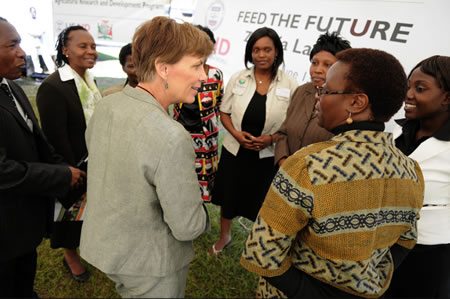“Feed the Future seeks to improve the lives of women through activities that increase agricultural productivity, provide access to markets and promote economic resilience, including household nutrition,” she said.
AWARD was highlighted as an example of what can be achieved when women scientists are empowered and supported in key areas addressed by the Feed the Future initiative, such as food security, poverty alleviation, and malnutrition. Seven Zambian women scientists, who are participants in AWARD, attended the event.
“AWARD is building a new generation of leaders. When our women’s capacity is built, good food security for Zambian families will surely follow,” said Bradford Machila, Minister of Livestock and Fisheries, addressing the audience.
AWARD is a professional development program that strengthens the research and leadership skills of African women in agricultural science, empowering them to contribute more effectively to poverty alleviation and food security in sub-Saharan Africa.
Each year, 60 African women scientists are chosen from among almost 800 applicants from across the continent to participate in AWARD’s two-year career-development fellowship. The program, led the Gender & Diversity Program of the Consultative Group on International Agricultural Research, is funded by the Bill & Melinda Gates Foundation and USAID.
AWARD fellows who attended the Feed the Future launch welcomed the focus on science and innovation, but emphasized that more women must be recruited as agricultural researchers for Zambia to fully realize its development capacity.
Dr. Christine Yamba Yamba, acting chief animal production officer at the Ministry of Livestock and Fisheries Development in Zambia and an AWARD mentor, said that women must be recognized as major players in Africa’s farm production.
“We, as women scientists, are needed to develop technologies and knowledge that will best suit our women folk,” she said. “To move forward, we need to make training more accessible to women scientists and ensure that our research facilities are improved to take our needs into consideration.”
AWARD fellow Maureen Hamiyanze, program manager of HODI’s Elimination of Child Labour Programme, agreed that women have a greater role to play in agriculture.
“Poverty and food insecurity have a woman’s face and the solution must have a woman’s face, as well,” she said. “Feeding the future will only happen if women are brought to the forefront of the agricultural profession; they have already been feeding people for generations from the background.”
Hamiyanze added that Zambia lacks an agricultural curriculum at primary school level that would encourage girls to consider a career in this area, and is working to develop one herself.
After the Feed the Future launch, AWARD fellows spoke to Dr. Howard about their professional development under the program. AWARD fellow and entomologist with the Cotton Development Trust in Zambia, Mutibo Chijikwa, observed that obstacles are two-fold for women in agricultural science.
“Research institutes are male dominated. Our voices are rarely heard,” she said. “The other challenge is family – sometimes, as a woman, you have to put your career on hold.”
Chijikwa said AWARD equips women scientists to overcome some of these challenges by pairing each fellow with a senior scientist as a mentor, as well as helping to build their science skills and develop their leadership capacity.
Pasture agronomist Lungowe Chisenga, said her female mentor’s career achievements and forthright approach in a male-dominated work environment has inspired her that “it can be done.”
“There are not many people specializing in this area,” she observed. “The biggest gain for me has been confidence in myself as a young woman scientist who may ‘feel the fear but do it anyway’”.
Zambia is one of 20 Feed the Future focus countries selected for investment, due to its significant agricultural potential and food security challenges. The launch of Feed the Future here follows the Africa Growth and Opportunity Act (AGOA) forum held in Lusaka, at which U.S. Secretary of State Hillary Clinton stressed the role of women as major drivers of economic growth. No country can prosper with half of its population left behind, she said.

